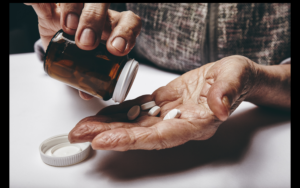Managing high blood pressure (hypertension) is essential for maintaining good health, and one of the most important factors in effective management is medication adherence. Consistently taking blood pressure medication at the same time every day can significantly reduce the risk of dangerous blood pressure spikes—sudden and severe increases in blood pressure. In this blog post, we’ll explore why consistent timing matters, what happens during a blood pressure spike, and how both can impact your overall health.
1. Why Consistent Medication Timing is Crucial
Blood pressure medications are most effective when taken regularly. Establishing a daily routine helps maintain stable medication levels in your bloodstream, reducing the likelihood of fluctuations that can lead to spikes.
When patients take their medication at the same time each day, they can:
Ensure Optimal Effectiveness: Regular dosing keeps blood pressure levels stable, allowing the medication to work effectively.
Reduce the Risk of Complications: Consistency helps prevent dangerous spikes that can lead to serious health issues.

Example: Consider Sarah, a 50-year-old woman with hypertension. She sometimes takes her medication in the morning and other times in the evening. This inconsistency can lead to peaks and troughs in her medication levels, resulting in fluctuating blood pressure and increasing her risk of complications.
2. Understanding Blood Pressure Spikes and Their Dangers
A blood pressure spike, also known as a hypertensive surge, occurs when blood pressure rises suddenly, often exceeding 180/120 mmHg. This condition can happen if medications are missed, delayed, or taken at inconsistent times.
One of the biggest concerns with blood pressure spikes is that they often have no symptoms. Many people may not realize their blood pressure has surged until it reaches a critical level. When symptoms do appear, they may include:
Severe headaches
Shortness of breath
Chest pain
Blurred vision
Nausea
Confusion
However, the absence of symptoms makes regular monitoring essential. Blood pressure spikes can lead to severe health risks, including:
Heart Attack: Increased workload on the heart can trigger a heart attack, especially in individuals with existing heart conditions.
Stroke: Elevated blood pressure can damage brain blood vessels, leading to stroke.
Kidney Damage: High blood pressure can impair kidney function, resulting in long-term damage.
Vision Loss: Sudden spikes can affect the eyes’ blood vessels, leading to potential vision issues.
Aneurysms: Weakening blood vessel walls can result in aneurysms, which may rupture and cause internal bleeding.
3. How to Prevent Blood Pressure Spikes
Taking your blood pressure medication at the same time every day is a powerful way to prevent dangerous spikes. Here’s how consistency can help:
Stabilizes Blood Pressure: Regular medication intake helps keep blood pressure levels steady, reducing the chance of sudden surges.
Minimizes Side Effects: A consistent routine helps patients anticipate and manage potential side effects more effectively.
Encourages Habit Formation: Associating medication with daily activities, like taking it with your morning coffee, can improve adherence.
Example: John, a patient with hypertension, struggled to remember his medication. By taking it with his morning coffee, he established a routine that improved his consistency and helped maintain his blood pressure within a healthy range.

4. What to Do If You Experience a Blood Pressure Spike
If you notice symptoms of a blood pressure spike—such as severe headache, chest pain, shortness of breath, or vision changes—seek medical attention immediately. Given that many spikes occur without symptoms, regular blood pressure monitoring is crucial for all patients, especially those with a history of hypertension.
In Conclusion
Taking blood pressure medication at the same time every day is vital for preventing dangerous blood pressure spikes.
Consistency helps maintain stable blood pressure, reducing the risk of severe complications like heart attack and stroke.
Healthcare providers can assist patients in establishing medication routines and offering reminders, empowering them to take control of their health.
Regular monitoring and communication about the importance of consistent medication adherence are key in preventing these dangerous situations.
Prioritizing these practices can significantly improve overall health and well-being for those managing hypertension.